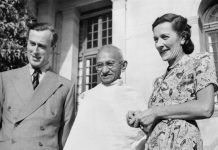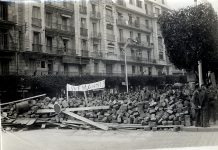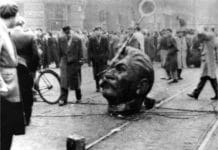
Socialistisk Biblioteks Tidslinje med links til begivenheder og personer i 1924.
Se også Index over personer, organisationer/partier og værker (som bøger, malerier, mm.), steder, begivenheder, mv., der er omtalt på hele Tidslinjen, titler og indhold på emnelisterne osv.
Bladliste
Nye blade 1924:
- Alarm. Udg. af De Faglige Klubbers Sammenslutning.
- Pioneren. Udg. af Unge Pionerer (kommunistisk børneorganisation).
- Sirius. Red. af Otto Gelsted.
Se:
- Arbejderhistorisk bladliste, under året 1878 (scroll ned).
7. januar 1924
Den britiske marxist og sociolog Ralph Miliband fødes i Bruxelles, Belgien. (Dør 21. maj 1994 i London). Grundlagde i 1964 årbogen Socialist Register sammen med John Saville. Far til Miliband-brødrene i det britiske Labour Party.
Links:
- Ralph Miliband (Spartacus Educational)
- Ralph Miliband (Wikipedia.org). Længere engelsk biografisk artikel med links.
- Ralph Miliband (Marxist Internet Archives). Biography, selected bibliography and works (articles 1958-1995, many from Socialist Register, incl. Thirty Years of The Socialist Register).
- Texter av den brittiska marxisten Ralph Miliband (Marxistarkiv.se). Bl.a. de to bøger: Statsmakten i det kapitalistiska samhället (1969) + Marx och politiken (1977)
Articles:
Ralph Miliband’s masterpiece at 50. By Leo Panitch (Jacobin, 16 June 2019). “Fifty years after it was published, Ralph Miliband’s The State in Capitalist Society remains indispensable for any socialist movement with ambitions of power.”
No easy outs: the revolutionary reformism of Ralph Miliband. By Shawn Gude (In These Times, May 7, 2015). Review of Ralph Miliband, Class War Conservatism: And Other Essays (Verso, 2015, 368 p.). “A new collection of essays by the seminal Marxist thinker highlights his simultaneously hopeful and clear-eyed vision, fiercely principled but always tethered to reality.”
Registering class and politics (Jacobin, December 11, 2013). “Leo Panitch on Ralph Miliband and fifty years of the Socialist Register.”
The Miliband affair. By Tariq Ali (Jacobin, October 11, 2013). “Ralph Miliband was no patriot. He was a stern critic of the British ruling elite and its institutions.”
Miliband and Marx. By Charlie Kimber (Socialist Worker, Issue 2374, 8 October 2013). “After the Daily Mail’s attack on Ed Miliband’s father, Charlie Kimber looks at what Ralph Miliband’s work can tell us about the nature of the Labour Party.”
Why my father loved Britain. By Ed Miliband (Daily Mail, 30 September 2013). ”
On Saturday, the Daily Mail chose to publish an article about him under the banner headline ‘The Man Who Hated Britain’.” See also The man who hated Britain. By Geoffrey Levy (Daily Mail, 27 September 2013).
Labourism and socialism: Ralph Miliband’s Marxism. By Paul Blackledge (International Socialism, Issue 129, Winter 2011, p.67-96). “… Miliband’s work deserves to be read by a new generation of socialists. Nevertheless, he should be read critically.”
Ralph was the real red Miliband. By Ian Birchall (Socialist Worker, Issue 2222, 9 October 2010). “Ralph Miliband’s writings remain a beacon of clarity for socialists striving to understand the capitalist state and the best way to overthrow it. I suspect he will still be remembered when his sons have faded into the irrelevancies of parliamentary manoeuvres.” See also the debate in Socialist Register: Ralph Miliband: Moving On (1976, p.128-40) + Duncan Hallas: How can we move on? (1977, p.1-10)
Ralph Miliband: accurate diagnosis, faulty prescription. By Phil Shannon (Green Left Weekly, Issue 546, July 23, 2003). Review of Michael Newman, Ralph Miliband and the Politics of the New Left (Merlin Press, 2002). “Miliband’s positive impact on an entire generation of British (and international) socialists is ably assessed, and deservedly celebrated, in Michael Newman’s biography of one of Britain’s leading Marxist political scientists.”
Ralph Miliband: Socialist intellectual, 1924-1994. By Leo Panitch (Socialist Register 1995, p.1-21). “Ralph Miliband stood as a beacon on the international Left. He epitomized what it meant to be a creative and independent socialist intellectual, and he provided consistent leadership in defining the issues for critical engagement.”
Ralph Miliband: The common sense of socialism (pdf). By Ellen Meiksins Wood (Radical Philosophy, Issue 68, Autumn 1994, p.62). “The steadiness of Miliband’s commitment owed much to the unflinching clarity of his intellectual vision and the independence of his political judgment …”
Obituary by Colin Barker (Socialist Review, Issue 176, June 1994). “His best memorial remains Parliamentary Socialism. Any thinking member of the Labour Party who reads it will shudder, or blush.” See also Letters (Issue 177, July/August 1994).
Ralph Miliband, 1924-1994. By Tariq Ali (Against the Current, Issue 52, September/October 1994). “Ralph Miliband was a socialist intellectual of great integrity. He belonged to a generation of socialists formed by the Russian Revolution and the Second World War.”
Muscular reformism. By Colin Barker (International Socialism, Issue 102, October 1977). Review of Ralph Miliband, Marxism and Politics (Oxford, 1977). “… Miliband has elaborated a position on the problem of the transition to socialism. It is this aspect of his book on which I shall focus this review, for space is limited.”
Se også/See also
- Socialist Register (site). Britisk socialistisk årbog.
Se også på Socialistisk Bibliotek:
- Tidslinjen 13. juni 2009 om John Saville.
- Tidslinjen 25. september 2010 om sønnen Ed Miliband, som vinder formandsposten i det britiske Labour Party.
9. januar 1924
Stiftelsesdagen for Arbejdernes OplysningsForbund (AOF).
Ud over den socialdemokratiske oplysningsvirksomhed, var AOF også forlag, der bl.a. udgav partihistoriske værker som “Pionerer” (1938), af Oluf Bertolt, AOF-leder fra 1930-57.
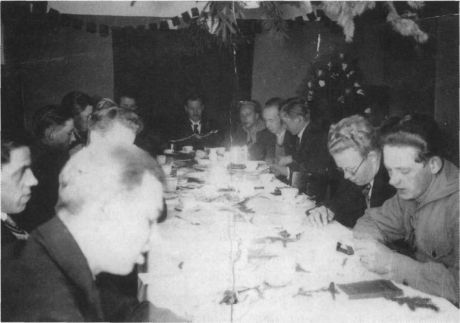
Se:
- Arbejdernes oplysningsforbund (AOF) (Leksikon.org)
- AOF (Wikipedia.dk)
- AOF (site)
- Om AOF Danmark
- Et ord til arbejderne. Af Hans Hansen-Hersnap (Weekendavisen, 13. juli 2012). Er på Infomedia via folkebibliotekerne.
“Arbejdernes Oplysningsforbund gik lige fra begyndelsen målrettet efter at skabe en positiv fællesskabsfølels blandt arbejderne i Danmark og var med til at sikre den historisk store opbakning i mellemkrigstidens Danmark.” Artiklen bygger på Hans Hansen-Hersnaps historiespeciale, “Arbejdernes Oplysningsforbund 1924-1940 – arbejderoplysningens virke, visioner og italesættelser”, fra april 2012. Det kan lånes på Arbejderbevægelsens Bibliotek og Arkiv.
Se også på Socialistisk Bibliotek:
L.P. Hansen (Socialister på Assistens Kirkegård). Om Arbejdernes Læseselskab.
21. januar 1924
Den russiske revolutionsleder Lenin dør (født 24. april 1870, se denne).
Den første soc.dem. regering Labour under Mcdonald – holder under et år, fra 22. januar til 4. november 1924 (den danske Stauning, først
3. februar 1924
Den britiske historiker E.P. Thompson [Edward Palmer] fødes i Oxford (dør 28. august 1993 i Worchester). Forfatter til The Making of the English Working Class (1963). Fremtrædende i New Left og i 1980’ernes fredsbevægelse.
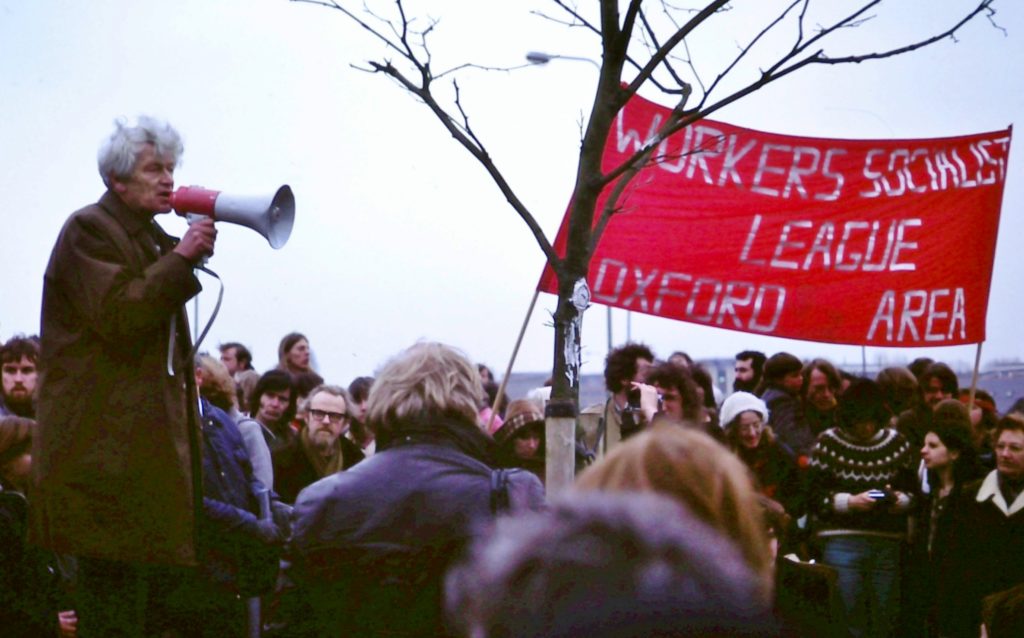
In Scandinavian:
- E.P. Thompson (Denstoredanske). Kort intro på dansk.
- E.P. Thompson (Wikipedia.no). Norsk artikel med link til lidt længere svensk. Links til bl.a. norsk biografisk Wiki-artikel.
E.P. Thompson og hvordan den engelske arbejderklassen skapte seg selv (pdf). (Arbejderhistorie, nr.3, 2013, s.88-93). “Arbejderhistorie markerer 50-året for udgivelsen af The Making of the English Working Class ved at bringe Frank Meyers artikel om E.P. Thompson og bogen.” Indledning ved Flemming Mikkelsen.
E.P. Thompsons videnskabelige fortælling om arbejderklassen og klassebegrebet (pdf). Af Erland Viberg Joensen (Arbejderhistorie, nr.2, 2009, s.51-66). “Med E.P. Thompsons klassestudier som udgangspunkt vil spørgsmålet om, hvorvidt klassebegrebet endnu har en berettigelse i historievidenskaben derfor blive diskuteret i denne artikel.”
Politik og historie i E.P. Thompsons forfatterskab: en biografisk og bibliografisk gennemgang (pdf). Af Erik Schwägermann (Årbog for arbejderbevægelsens historie, nr.21, 1991, s.201-220). “… han formår at skrive historiske værker, hvis litterære kvalitet er forbilledlige.”
Om Edward Palmer Thompson (pdf). Af Lars Magnusson (Marxistarkiv.se, december 2015). “Den följande artikeln, som utgjorde efterskrift till Thompson-antologin Herremakt & folklig kultur (1980), är ett försök att sammanfatta den brittiske marxistiske historikern E P Thompsons betydelse och roll i den brittiska vänstern.”
Kvindekøn og arbejderhistorie: kvinder i “The Making of the English Working Class” (pdf). Af Joan Wallach Scott (Årbog for arbejderbevægelsens historie; nr.19, 19189, s.207-235). “Når man idag genlæser bogen, er det umiddelbart iøjnefaldende, ikke hvor fraværende kvinderne er, men hvor ubehjælpsomt de optræder i beretningen.”
Talking History: E.P. Thompson and C.L.R. James 1901-89. (YouTube.com, 1983, 51:40 min.) – jump to 0:17 to avoid the ear splitting noise. Se også linkboxen C.L.R. James (Socialistisk Bibliotek).
In English:
- E.P. Thompson (Marxists Internet Archive). With biography & Texts By Thompson. + articles n his works and life by Duncan Hallas, Michael Löwy and Barbara Wilslow.
- E.P. Thompson (Wikipedia.org)
- The Making of the English Working Class (Wikipedia.org) + The Making of the English Working Class. By E.P. Thompson (Victor Gollancz, 1963, 848 p.; online at Libcom.org)
E.P. Thompson: A Twentieth Century Romantic. By Mark Jones (Marx & Philosophical Review of Books, 1 July 2018). Review of Christos Efstathiou’s book (Merlin Press, 2015, 248 p.): “[The book] places the emphasis very much on its subject’s role as life-long political activist with his achievements as a renowned and influential Marxist social historian being something of a secondary consideration.”
E.P. Thompson’s romantic Marxism. By Jeffery R. Webber (Jacobin, July 24, 2015). “E.P. Thompson brilliantly chronicled the ravages of early capitalism and the fierce resistance it provoked.”
E.P. Thompson: A giant remembered. By Paul Buhle (Monthly Review, Vol.66, No.5, October 2014). Review of E.P. Thompson and the Making of the New Left: Essays & Polemics, edited by Cal Winslow (Monthly Review Press, 2014, 333 p.). See also review by Dominic Alexander (Counterfire, May 22, 2015) + review by Allister Mactaggart (International Socialism, Issue 149, Winter 2016) + review by Joseph White (New Politics, Issue 61, Summer 2016) + review by Dan Johnson (Against the Current, Issue 188, May-June 2017)
Commemorating a classic of history. By the Editors (Against the Current, Issue 166, September-October 2013 + Issue 167, November 2013 + Issue 168, January-February 2014):
Ellen Meiksins Wood: Recovering the contrality of class (Issue 166)
Paul Buhle: Remembering E.P. Thompson (Issue 166)
Bruce Levine: A flawed conception of class (Issue 166)
Bryan D. Palmer: History as argument (Issue 166)
Barbara Winslow: E.P. Thompson: feminism, gender, women and history (Issue 167)
Rafael Bernabe: Thompson, William Morris and ecosocialist tasks (Issue 167)
Sheila Cohen: On E.P. Thompson’s legacy (Issue 168)
Manuel Yang: Breadking the grid, making our class (Issue 168)
A class that made itself (Socialist Review, Issue 379, April 2013). “Socialist historian E.P. Thompson’s classic book The Making of the English Working Class was first published 50 years ago. Keith Flett takes a look at this seminal work of labour history that placed workers at the centre of making their own history.”
Remembering E P Thompson. By Christian Høgsbjerg (International Socialism, Issue 134, Spring 2012). Review of Scott Hamilton, The Crisis of Theory: EP Thompson, the New Left and Postwar British Politics (Manchester University Press, 2011). See also review by Dominic Alexander: The crisis of theory: E P Thompson, the new left and postwar British politics (Counterfire, 6 October 2011)
E P Thompson and The Making of the English Working Class (Counterfire, 9 April 2010). “Dominic Alexander defends E.P. Thompson’s The Making of the English Working Class – one the most debated and influential of all the books produced by British Marxist historians.”
E.P. Thompson: The activist historian. By David Renton (New Correspondence, Vol.1, No.1, September 2004, p.20-24; online at Internet Archive WayBackMachine). “The point of this paper is not merely to praise an important writer and activist. It shall also engage with some of the most important ideas found in Thompson’s work and their reception since.”
E.P. Thompson, 1924-1993 (pdf). By Kate Soper (Radical Philosophy, Spring 1994). “We shall miss very dearly this formidable thinker, with the cat around his shoulders, whose opinions he every so often saw fit to consult.”
The hidden Marxism of The Making of the English Working Class. By Bernie Moss (What Next?, No.26, 2003; online at Internet Archive). “This paper was presented at a conference organised by the London Socialist Historians Group in London on 10 May 2003.”
Edward Thompson, the Communist Party and 1956. By John Saville (The Socialist Register, 1994, pp.20-31). “The account that I wrote for the Socialist Register in 1976 set down the chronology that led to the publication of The Reasoner July-October 1956 and the general crisis in the Communist movement in Britain that produced its three issues.”
The making of a working class historian. By Duncan Hallas and Alex Callinicos (Socialist Review, No.168, October 1993, p.20-22; online at Marxists Internet Archive). “What is Thompson’s lasting contribution? It is, undoubtedly The Making of the English Working Class.”
E.P. Thompson: class struggle and historical materialism. By David McNally (International Socialism, Issue 61, Winter 1993, p.75-89; online at Marxists Internet Archive). “Thompson launched a current in Marxist history which restored the exploited and oppressed to their rightful place as makers of history.”
The ingredient of humanity. By Alex Callinicos (Socialist Review, No.9, February 1979). Review of E.P. Thompson, The Poverty of Theory and Other Essays (Merlin Press, 1978): “Reading this selection of essays by one of the most outstanding marxist writers in Britain today, I was struck by the continuity in Edward Thompson’s thought.”
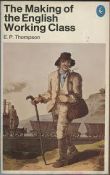
Litteratur:
- ‘Hinsides den kolde krig’. Af E.P. Thompson, i: Der er kun ét Europa. Red. Søren Møller Christensen (Eirene, 1982, s.21-63)
- ‘Tilintetgørelsen, civilisationens slutfase’. Af Edward P. Thompson. I: 80’ernes udfordring: en antologi om atomoprustningens logik og fredsbevægelsens politik. Red. Jesper Højberg Christensen (Politisk Revy, 1982, s.48-80)
- ‘Europa: den kolde krigs svage led’. Af Edward P. Thompson. I: ibid. (s.294-313)
Se også / See also:
- Sheila Rowbotham on E. P. Thompson, Feminism, and the 1960s (Jacobin, June 29, 2020). “In an interview, longtime socialist-feminist historian Sheila Rowbotham reflects on her decades on the Left … and E.P. and Dorothy Thompson and the classic book The Making of the English Working Class.”
- Reason in revolt. By Lawrence Parker (Weekly Worker, Issue 1138, 19 January 2017). Review of Paul Flewers and John McIlroy (editors), 1956: John Saville, EP Thompson and The Reasoner (Merlin Press, 2016, 450 p.)
- Marxism and the Missiles 1980. By Chris Harman (Socialist Review, No.9, October 1980). “This article is a critical analysis at the historian Edward Thompson theory of ‘exterminism’.”
- Historikergruppen i det britiske kommunistparti (Leksikon.org)
- Communist Party Historians Group (Wikipedia.org)
23. april 1924
Dansk-Russisk Samvirke oprettes.
Se:
- Dansk Russisk Forenings historie (PerBenny.dk)
- Dansk-russisk samvirke i 75 år (pdf). Redigeret af Asger Pedersen (Dansk-Russisk Forening, juni 1999, 22 s.).
23. april 1924
Første arbejderregering i Danmark under ledelse af Thorvald Stauning (til 14. december 1926)
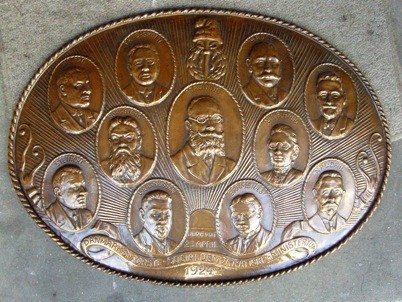
Regeringen Stauning kobberplatte. Af Chas [Charles?] Christensen. Se: Plakette fra Socialdemokratiet, 1924 (Danmarkshistorien.dk).
Litteratur:
- Arbejderregering på kobberplatter (pdf). Af Henning Grelle (Arbejderbevægelsens Bibliotek og Arkiv; Årsskrift 1997, side 36-40). Scroll ned.
Se:
- Ministeriet Thorvald Stauning I (Wikipedia.dk)
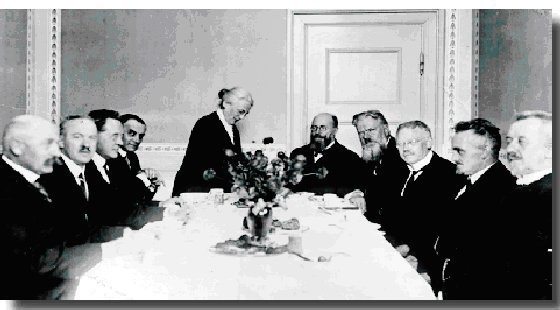
Se også på Socialistisk Bibliotek:
- Tidslinjen: 26. oktober 1873, om Thorvald Stauning.
- Tidslinjen: 16. oktober 1866, om Nina Bang.
- Tidslinjen: 28. oktober 1933, om KK Steincke (1880-1963).
- Linkboksen: Socialdemokratiet
23. april 1924
Den italienske venstrefløjspolitiker, Rossana Rossanda fødes i Pula (nu Kroatien, dengang Pola, Italiensk). Død 20. september 2020.
Medstifter af dagbladet Il Manifesto (23. august 1969 – maj 2012) og venstrefløjsgruppen PdUP. Partito di Unita Proletaria per il comunismo (1972-1974).
Se:
- Rossana Rossanda (Wikipedia.org). Med links til nogle værker på engelsk.
- Rossana Rossanda (Marxists Internet Archive; svensk avdelning). Tekst på svensk: Klasse och parti (1969).
Rossana Rossanda holdt fast i de bedste traditioner på Italiens venstrefløj. Af Matt Myers (Solidaritet.dk/Kritisk Revy, 18. marts 2024). “Rossana Rossanda repræsenterede det allerbedste i den generation, der blev tiltrukket af den italienske kommunisme i 1940’erne. Rossanda insisterede hele sit liv på behovet for en militant arbejderklassepolitik, mens store dele af den italienske venstrefløj mistede sit politiske ståsted.”
In English: Rossana Rossanda upheld the best traditions of Italy’s Left (Jacobin, March 3, 2024).
Addio Rossana Rossanda! (Autonom Infoservice, 22. september 2020). “Rossana Rossanda har med sine talrige debatindslag og bøger præget den samfundskritiske diskurs i Italien.”
Rossana Rossanda fought for the world revolution. By Ingar Solty (Jacobin, April 23, 2024). “Italian Marxist Rossana Rossanda was born 100 years ago today. Her country’s Communist Party sought a gradualist ‘Italian road to socialism’ — but she insisted that the class struggle in Italy was tied to the fate of the world revolution.”
Marking 50 years (Weekely Worker, Issue 1348, 20 May 2021). “Founded by expelled PCI members, Il Manifesto has successfully outlived its rivals. Toby Abse praises the consistent anti-capitalism and pans the Maoist absurdities.”
Rossana Rossanda wanted a party of and for workers in struggle. By Mattia Gambilonghi (Jacobin, October 29, 2020). “Rossana Rossanda died last month after decades of commitment to first the Italian Communist Party and then the dissident manifesto group. She insisted that a left party should be shaped by the demands of workers’ everyday struggles.”
Rossana Rossanda and the unfinished project of a critical communism. By Panagiotis Sotiris (Historical Materialism, Blog, October 22, 2020; online at Internet Archive). “Rossana Rossanda … exemplified the combination of a profound intellectuality and an equally profound political but also moral commitment that marked the best moments of European communism of the 20th century.”
Rossana Rossanda, the intense passions of an austere woman (Verso, Blog, 28 September 2020). “Rossana Rossanda, one of Il Manifesto’s founding editors, passed away on Sunday at the age of 96. Here, comrade Luciana Castellina writes about her extraordinary life and her influential position on the Italian left.”
Rossana Rossanda (1924–2020). By David Broder (Jacobin, September 22, 2020). “Rossana Rossanda, who died on Sunday at age 96, was an anti-fascist partisan and cofounder of Italy’s il Manifesto newspaper. A communist till the last, she insisted that the Left must defend its own identity — and unflinchingly take sides with the exploited and oppressed.”
How 1968 marked a shift for Rossana Rossanda’s radical politics (Jacobin, September 21, 2020). “Sunday saw the passing of Rossana Rossanda, a lifelong communist, anti-fascist partisan, and cofounder of il manifesto newspaper. In this extract from her memoirs, she explains how the upheavals of 1968 marked a radical shift in her political engagement, as both the Prague Spring, and worker and student revolts in Italy drove an enduring split in Communist Party ranks.”
Who I was in 1968 and other confessions: an interview with Rossana Rossanda (Verso, Blog, 18 January 2018). “The legendary figure of the Italian left discusses her new book, her coming to feminism, and her memories of 1968.” See other interviews with RR at Verso:
“Since ’68 the Italian Left has lost its bearings” (13 April 2018)
We shouldn’t oversimplify the current Italian situation (24 April 2018)
“Nothing is inevitable” (18 May 2018).
Memoirs of a loyal oppositionist. By Toby Abse (Weekly Worker, Issue 907, March 29, 2012). Review of Rossana Rossanda’s memoirs, The Comrade from Milan (Verso, 2010, 384 p.). “Rossana Rossanda … has been one of the most significant female political figures of 20th century Italy.”
See excerpt from the book:
“There were no teachers”: Rossana Rossanda on May 68 (Verso, Blog, 9 May 2018).
The Comrade from Milan (New Left Review, Issue 49, January-February 2008, p.76-100). With biograpical introduction.
Sartre’s political practice. By Rossana Rossanda (The Socialist Register, 1975, p.48-74). “Sartre’s political actions, rather than his political thinking, are the subject of these notes: the way he has judged the history through which he has lived, how he chose sides, and why, the people he allied himself with, and those he allies himself with today.” På dansk nedenfor.
Revolutionary intellectuals and the Soviet Union. By Rossana Rossanda (The Socialist Register, 1974, p.21-47). “A relationship with the socialist countries – with revolutions ‘elsewhere’ – has been part of the history of the European left, which has not had its revolution, for fifty years. A relationship composed of hopes and disappointments, alliances and recantations, inspiring utopias and depressing realisms.”
What Salvador Allende feared. By Rossana Rossanda (Jacobin, September 11, 2019). “On September 11, 1973, Chile’s socialist president Salvador Allende was overthrown in a CIA-backed military coup. In this 1971 interview, published in English for the first time, Allende expressed his fears of internal destabilization and US interference.”
Mao’s Marxism. By Rossana Rossanda (The Socialist Register, 1971, p.53-80). “In its first editorial, a year ago, Il Manifesto explicitly referred to the example provided by the “cultural revolution”. We were then still members of the Communist Party, and in this way we showed the Party that the cultural revolution appeared to us as one of the roads 1 that must be taken in order to regenerate not only the Party itself but also the strategy of the revolutionary movement in the West.”
Class and party. By Rossana Rossanda (The Socialist Register, 1970, p.217-231). “It has often been said that one would seek in vain a theory of class or of the party in Marx. This is true; except for the fact that the prob- lem of class is present throughout his work in such abundance and depth as to make possible the reconstruction of the theory which his analysis implies.”
Rossanda taler (på italiensk) om venstrefløjen m.m. 6. maj 2008 (YouTube, 9:11 min)
Litteratur på dansk:
Rossana Rossanda: Halvdelen af jorden: dialog med feminismen (Politisk Revy, 1981, 240 sider)
Rossana Rossanda: Sartre og den politiske praksis (pdf) (Kultur & Klasse, nr.34, 1979, s.70-103; online på Tidsskrift.dk). Engelsk udgave, se ovenfor. “Det er vanskeligt at adskille hans impasses og nederlag fra hele det revolutionære venstres i de sidste fyrre år; den vestlige revolutions forhåbninger og nederlag har i ham, som i få andre, ikke et vidne eller en historiker, men et enestående sammenløbspunkt …”
Rossana Rossanda: Venstrefløjen og Sovjetunionen [1-2] (Socialistisk Politik, nr.2, februar 1976, s.14-21 + nr.3, maj 1976, s.22-28)
Il Manifesto: klasse, parti, arbejderråd. Red. Jørgen Stender Clausen (Røde Hane, 1973, 267 sider). Artikler fra tidskriftet/dagbladet Il Manifesto, af bl.a. Lucio Magri og Rossana Rossanda.
Se også:
Proletarian Unti Parti (Italy). Om PdUP.
Il manifesto (Wikipedia.org)
Arrivederci Il Manifesto? Af Alfred Lang (Modkraft.dk/Kontradoxa, 29. maj 2012)
Il Manifesto: on the wrong side and kicking. By Fabio De Propris (Swans Commentary, June 28, 2010)
Italian Communism remembered (New Left Review, Issue 151, May-June 1985; online at Jacobin, 31 March 2014). Interview with Luciana Castellina on Il Manifesto and the PCI.
Se også på Socialistisk Bibliotek:
Tidslinjen 28. november 2011 om Lucio Magri.
10. juni 1924
Den italienske socialistleder Giacomo Matteotti (født 22. maj 1885) dræbes i Rom af fascister. Lagde navn til den socialdemokratiske antifascistiske hjælpefond, Matteottifonden.
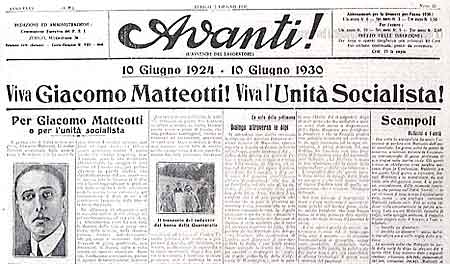
Se:
- Giacomo Matteotti (Denstoredanske.dk)
- Giacomo Matteotti (Wikipedia.org)
Se også:
Matteotti-Komiteen og Hitler-flygtningene (pdf). Af Minna Steffen Pedersen (Årbog for arbejderbevægelsens historie, nr. 20, 1990, side 305-349). “… det kunne knibe –
ikke blot med klassesolidariteten, men også med humanismen, hvilket fremgår af de tyske flygtninges skæbne. Matteotikomiteen indordnede kort sagt sit hiælpearbejde for de tyske flygtninge i overensstemmelse med regeringens politik i forholdet til Tyskland både
før og efter besættelsen.”
- Socialdemokratiet og nazismen (Arbejdermuseet; Plads til os alle). “… efter nazisterne tager magten i Tyskland bliver modstanden mere vag. Man håber, at Tyskland under en eventuel kommende krig vil respektere Danmarks neutralitet og vil derfor ikke genere den store nabo mod syd.”
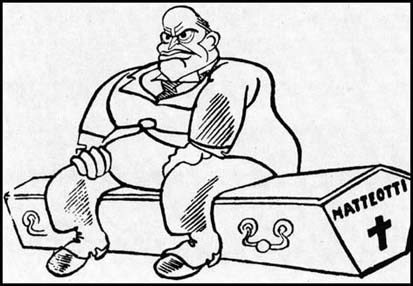
17. juni – 8. juli 1924
Kommunistiske Internationale, Komintern, afholder sin femte kongres i Moskva. Den første efter revolutionslederen Lenins død og fascismens fremmarch i Italien. Kongressen beslutter at “bolsjevisere” alle kommunistiske partier.
“… The Fifth World Congress was an arena for the struggle between the various groups in the [Russian] Politbureu; it had no other meaning and it had little authority … rhetorical tirades on Trotskyism … accused of … past and present deviations from Leninist doctrine; all of which related to … before the 1917 revolution [and] had lost their relevance … Stalin became known to Comintern delegates for the first time ...” (Ruth Fischer: Stalin and German Communism, Cambridge, 1948, p.404-405).
Se om Ruth Fischer på Tidslinjen 13. marts 1961.
Se:
- The Communist International 1919–1943 (Marxists Internet Archive). Scroll ned.
The forgotten Fifth Comintern Congress: Bridge between Lenin and Stalin (Marxist Essays and Commentary, June 23, 2014). “A new study by Joel Geier examines the Fifth Congress, claiming that it has a distinctive character, bearing the imprint of the Comintern’s president at that time, Grigorii Zinoviev.”
Left oscillation – right turn. Chapter 5 in Duncan Hallas: The Comintern (Bookmarks, 1985, p.104-122). “‘Bolshevisation’ was the watchword of the fifth congress of the Comintern in June-July 1924.”
Se også:
Zinovievism and the degeneration of world Communism. By Joel Geier (International Socialist Review, Issue 93, Summer 2014, p.41-73). “The purpose of this essay is to understand the content of Zinoviev’s underexplored legacy. I will argue that Zinovievism was a political current distinct from both Leninism and Stalinism, despite attempts to conflate these three greatly dissimilar political currents.”
Se også på Socialistisk Bibliotek:
Linkboxen: Kommunistisk Internationale (Komintern) 1919-1943
1. august 1924
Lenins mausoleum åbnes på Den Røde Plads i Moskva med udstilling af det balsamerede ikon.
Se:
- Lenins mausoleum (Wikipedia.dk)
- Lenin Mausoleum (site). Med historiske foto.
Se også Socialistisk Bibliotek:
- Tidslinjen 22. april 1870 om V.I. Lenin.
- Linkbox: Lars T. Lihs Lenin-biografi
2. august 1924
James Baldwin fødes i Harlem, New York City (dør 30. november 1987 i Saint-Paul, Frankrig).
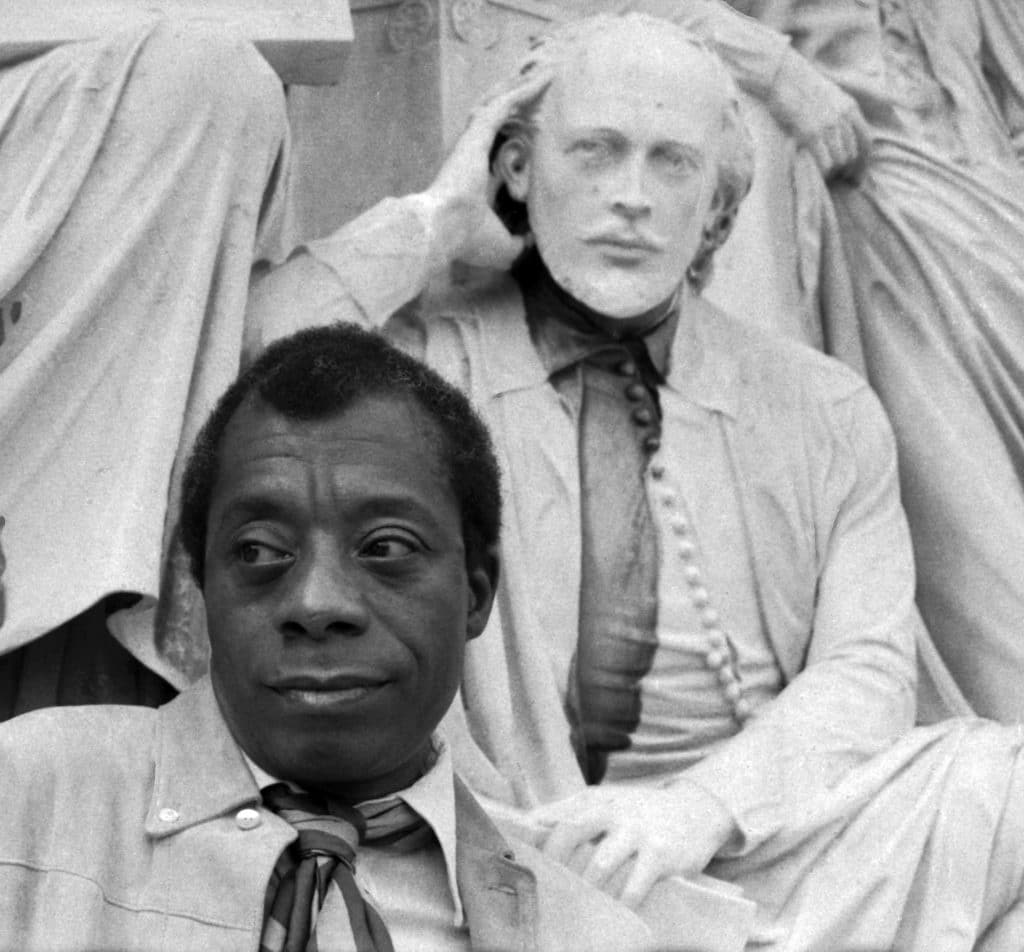
Links:
- James Baldwin (Bibliografi.dk: international forfatterbibliografi)
- James Baldwin (Wikipedia.org)
To James Baldwin, the struggle for black liberation was a struggle for democracy. By Blair McClendon (Jacobin, June 19, 2021). “James Baldwin knew that racism, properly understood, is a question of tyranny: wherever it persists, democracy does not.”
James Baldwin for our time. By Mary Helen Washington (Against the Current, Issue 210, 2021). Review of Eddie S. Glaude, Jr., Begin Again: James Baldwin’s America and Its Urgent Lessons For Our Own (Crown Publishing, 2020, 272 p.) + Bill V. Mullen, James Baldwin: Living in Fire (Pluto Books, 2019, 256 p.). “My question – Why Baldwin and why now? – is partially answered in these two impressive studies of the life and work of Baldwin.”
The Socialism of James Baldwin. By Arvind Dilawar (Jacobin, January 2, 2021). “James Baldwin went from espousing radical politics as a teenager to disavowing socialist politics as doctrinaire. But by the end of his life, inspired by the radicalism of the Black Panthers, Baldwin was again ready to proclaim himself a socialist.”
James Baldwin: Living in Fire. By Adam Tomes (Counterfire, February 13, 2020). Review of Bill W. Mullen’s book (Pluto Press, 2019, 230 p.). “Living in Fire is a pithy yet powerful introduction to James Baldwin’s political life as a street fighting intellectual, raging against the world’s racist and reactionary forces.”
James Baldwin’s journey (SocialistWorker.org, September 21, 2017). “Ronnie Flores introduces the writings of one of the 20th century’s great novelists and essayists–and his political transformation in the era of the Black freedom struggle.”
James Baldwin’s Harlem: The key to his politics. By Gerald Meyer (Socialism and Democracy, Vol.25, No.1, March 2011, p.273-281). Review of Herb Boyd, Baldwin’s Harlem: A Biography of James Baldwin (Simon and Schuster, 2008, 272 p.). “The publication of a paperback edition of Herb Boyd’s book brings a fresh interpretation of Baldwin’s life and work to the attention of Baldwin loyalists as well as to potentially larger audiences.”
James Baldwin – Pin Drop Speech (YouTube.com, 8:14 min). James Baldwin delivers earth shattering speech at Cambridge University (1965) during a debate with William F. Buckley. + Why James Baldwin Beat William F. Buckley in a Debate, 540-160. By John Griswold (Blog: Inside Higher Ed, April 8, 2012).
I am Not Your Negro (documentary by Raould Peck, 2016/2017, see Wikipedia). Online på DR indtil 31. maj 2023.
‘I Am Not Your Negro’ gives James Baldwin’s words new relevance (National Public Radio, NPR, February 3, 2017). “Editor’s note: This piece includes quotes from James Baldwin in which he uses a racial slur.“
I Am Not Your Negro. Af Ernest Tate (Socialistisk Information, 8. oktober 2017). “Raoul Pecks [film] … er afgjort værd at se.”
Film of the week. By Dragan Plavšić (Counterfire, June 19, 2020). “I Am Not Your Negro is an unforgettably powerful film that you must not miss.”
Lessons from James Baldwin. By John Woodford (Against the Current, Issue 192, January-February 2018). Review of William J. Maxwell (ed), James Baldwin: The FBI File (Arcade Publishing, 2017, 430 p.) + I Am Not Your Negro, documentary film directed by Raoul Peck (Magnolia Pictures, 2017)
James Baldwin, Stan Weir, and Socialism. By Dan La Botz (New Politics, Blog, May 3, 2017). “Raoul Peck’s powerful documentary ‘I Am Not Your Negro’ … presented Baldwin as a powerful voice of the black liberation movement, but hardly mentioned his longtime commitment not only to full equality for black Americans, but also to socialism.”
Who James Baldwin was and why you should see I Am Not Your Negro (Socialist Worker, Issue 2549, 11 March 2017). “Elizabeth Grant-Campbell reviews I Am Not Your Negro, a new film about radical writer and activist James Baldwin, and Dave Sewell looks at the work and politics of a unique fighter against oppression.”
I Am Not Your Negro: Raoul Peck’s documentary on James Baldwin. By Clare Hurley (World Socialist Web Site, 14 February 2017). “The American novelist, essayist and intellectual James Baldwin is the subject of Raoul Peck’s stylish, but ultimately superficial and often wrongheaded quasi-documentary …”
How Baldwin saw Palestine (Marxist Marginalia, June 21, 2010). “Paul Heideman discusses solidarity with Palestine through the work of Black author James Baldwin.”
12. september 1924
Amílcar Cabral fødes i Bafatá (Guinea, daværende portugisisk koloni). Myrdes ved bombeattentat 20. januar 1973 i Conakry, Guinea. Guerilla-teoretiker og grundlæggeren (1956) af PAIGC og befrielsesbevægelsen i Angola (med Agostinho Neto).
![Portrait of Amilcar Cabral, wearing the sumbia - traditional skullcap [presumably during the Cassacá Congress, freed from the southern region of Guinea]. Februar 1964. Source: http://casacomum.org/cc/visualizador?pasta=05221.000.030 Photo: Anonymous. Public Domain.](https://socbib.dk/wp-content/uploads/2008/07/Cabral_2-1024x747.png)
Se:
- Cabral, Amilcar (Leksikon.org).
- Amilcar Cabral (Wikipedia.org). Med links.
- Amilcar Cabral (Marxists Internet Archive; Marxism and Anti-Imperialism in Africa). Articles 1961-1969.
The secret of the failure of liberation – a tribute and celebration of Amilcar Cabral fifty years on. By Leo Zeilig, Chinedu Chukwudinma, and Ben Radley (ROAPE, March 16, 2023). “Cabral was a unique thinker and fighter for African liberation, and emerged as a leading figure in the ‘second liberation’ struggles against Portuguese colonialism in the late 1960s and 1970s.”
Amilcar Cabral: A Pan-African Revolutionary. By Ameth LO (Marxist Essays and Commentary, March 28, 2023). “The relevance of his praxis for Africa in a world undergoing geopolitical reconfiguration.”
Guinea-Bissau’s liberation struggle transformed the face of world politics. By Rui Lopes and Victor Barros (Jacobin, December 23, 2022). “A movement led by Amílcar Cabral fought against Portuguese rule in Guinea-Bissau and won independence against seemingly overwhelming odds. It also contributed to the end of white-settler rule in Southern Africa and the democratic revolution in Portugal itself.”
Amilcar Cabral — armed struggle and national liberation. By Charlie Kimber (Socialist Worker, Issue 2777, 16 October 2021). “As we celebrate Black History Month, the story of Amilcar Cabrial, leader of the Guinean resistance against colonialism, offers inspiration but also lessons about the limitations of socialism from above.”
Resistance and Decolonization. By Dianne Lalonde (Marx & Philosophy Review of Books, 30 December 2016). Review of Amilcar Cabral’s book (Rowman & Littlefield International, London, 2016, 196 p.). “[The book] is essential and successful in rendering African critical theory and its rich insights more visible.”
Amílcar Cabral and the African Revolution. By Arturo Rodriguez (In Defence of Marxism, 25 May 2016). “Cabral was an important anti-imperialist figure to emerge from the convulsive decades of decolonisation in Africa, and as Africa is entering a new period of revolutionary upheaval it is important for Marxists to understand what these historical figures really stood for.”
Cabral: Exemplary light and guide for the pan-African and socialist revolution. By Imani Na Umoja (Pambazuka News, January 22, 2014; online Internet Archive). “Few countries in Africa have achieved total independence, despite the formal end of colonialism, and none have yet been able to liberate the productive forces and place them in the hands of the people. Amilcar Cabral’s thought provides the roadmap to achieve this.”
Remembering Cabral (ROAPE, April 20, 2023). “In the final essay to mark the fiftieth anniversary of national revolutionary leader Amílcar Cabral’s murder in 1973, first published in the ROAPE journal thirty years ago, Basil Davidson provides a personal portrait.”
Amílcar Cabral’s theory of class suicide and revolutionary socialism. By Tom Meisenhelder (Monthly Review, Vol.45, No.6, November 1993; online at Libcom.org). “Amilcar Cabral was the revolutionary socialist leader of the national liberation movement that freed Guinea-Bissau from Portuguese colonialism. Although he was an important historical actor, here I am most interested in his development of a general theory of socialist revolution in the periphery.”
Review by John Newsinger of A. Cabral, Unity & Struggle and J. Saul, The State and Revolution in East Africa (International Socialism, Issue 12, Spring 1981, p. 121-125; online at Marxists Internet Archive). “Cabral, who was assassinated by the Portuguese secret police in January 1973, has been widely recognised as one of the foremost theoreticians of national liberation in the contemporary world, as an intellectual who tried and proved his ideas in practice.”
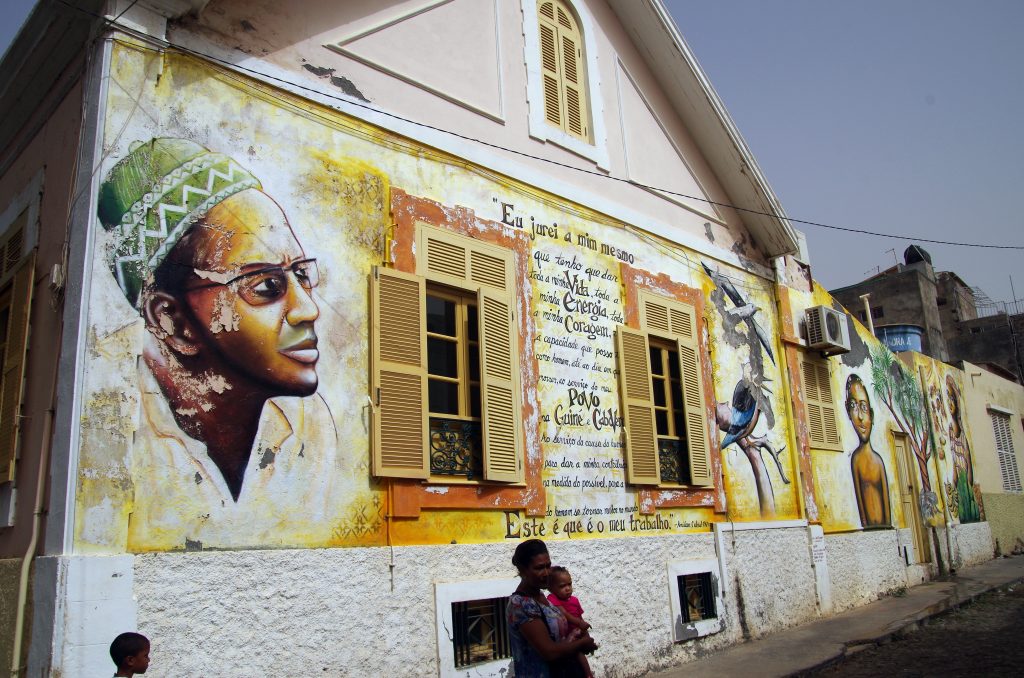
(CC BY-SA 4.0).
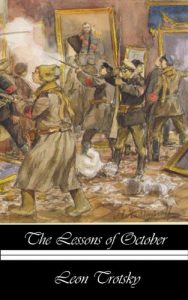
15. september 1924
Trotskij færdiggør Læren af Oktober (“Oktobers læredomme”). Udgives 6. oktober 1924.
Se:
- Lærdommene fra oktober (Oslo, Internationale Sosialister, 1997, 54 sider; online på Marxists Internet Archive; Norsk seksjon).
- De tyske begivenheder i 1923 og læren af Oktober. Af Leon Trotskij (1928) (Marxister.dk)
- Lessons of October (Wikipedia.org)
Læren af den russiske revolution: Leon Trotskij: “Læren af Oktober”. Af Jørn Andersen (Socialistisk Arbejderavis, nr. 170, 6. november 1997). “Trotskijs pjece handler om udviklingen internt i bolsjevikpartiet, da det stod over for opgaven med at organisere oktoberopstanden.”
Memory wars (Weekly Worker, Issue 1417, November 3, 2022). “Jack Conrad explains that Trotsky’s 1924 Lessons of October has been widely accepted as a right and proper account. Certainly, when it comes to the left, however, that orthodoxy needs to be overthrown as a matter of urgency.” See Part 2 (ibid., Issue 1418, November 10, 2022) + Part 3 (ibid., Issue 1419, November 17, 2022).
The Bolsheviks and democracy (Weekly Worker, Issue 1225, 1 November 2018). “Jim Creegan rides to the defence of Trotsky’s Lessons of October.”
An introduction to Trotsky’s ‘The Lessons of October’ (Counterfire, November 7, 2017). “On the 100th anniversary of the October revolution, Alex Snowdon introduces a key chapter from Trotsky’s radical book on the subject.”
Why read… Lessons of October. By Richard Donnelly (Socialist Review, Issue 387, January 2014). “The Lessons of October is Trotsky’s attempt to analyse why this historical opportunity was passed by – and why the Russian Revolution succeeded.”
Introduction to Trotsky’s The Lessons of October. By Duncan Hallas in: Leon Trotsky, The Lessons of October (Bookmarks, 1987, p.1–8; online at Marxists Internet Archive). “The reaction in the USSR to this short booklet was a storm of polemic, scholastic quibbling, vulgar abuse and down-right falsification.”
Se også:
Trotsky’s Challenge: The Literary Discussion of 1924 and the Fight for the Bolshevik Revolution. Edited by Frederick C. Corney (Haymarket Books, 2017, 856 p.). “The debates surrounding the publication of Trotsky’s Lessons of October are here collected, translated, and explained for the first time.”
The political struggles in Russia, 1921-1929. By Pierre Broué (Marxists Internet Archive). Chapter 7-11 of The history of the Bolshevik Party (CP) of the U.S.S.R. (1971; online at Marxists Internet Archive)
30. september 1924
Forfatteren Truman Capote fødes i Los Angeles (dør 25. august 1984 samme sted)
Se:
- Truman Capote (Wikipedia.org)
- American artists and American tragedy. By David Walsh (World Socialist Web Site, 17 November 2005)
Litteratur:
Med koldt blod: en sandfærdig beretning om et massemord og dets følger (Gyldendal, 1966, 329 sider)
12. oktober 1924
Den franske sociale forfatter Anatole France dør (født 6. april 1844, Se denne) .
12. december 1924
Den socialistiske skribent, teoretiker og handelsmand Alexander Parvus dør i Berlin. (Født i 8. september 1867 i Berasino, Hviderusland, 8. september 1867, se denne)
17. december 1924
Stalins teori om Socialisme i et land formuleres.
- J.V. Stalin: Oktoberrevolutionen og de russiske Kommunisters Taktik (Oktobernet.dk). Forord til bogen På vej til oktober (1924)
- ‘Socialisme – i eet land’. Tillæg, – i: Leon Trotskij: Revolutionen forrådt (Borgen, 1960). Opr. udgivet i 1936.
- The theory of Socialism in One Country. – i: Max Shachtman: Genesis of Trotskyism (1933)
- Socialism in a separate country? (pdf) Appendix No.2, s. 283 – i: Leon Trotsky: The History of the Russian Revolution, Vol.3 (1932)
Litteratur:
J.V. Stalin: Leninismen Problemer (Tiden, 1949). Heri: ‘Oktoberrevolutionen og de russiske Kommunisters Taktik’ (s.83-111)

















